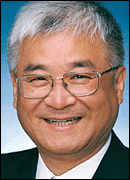

![]()
Pacific Perspective


![]()
Pacific Perspective
Can we ask for a level
playing field in the
post-WTO China?China officially became a member of the World Trade Organization on Dec. 11, 2001. In addition to lowering tariff barriers, China made a number of commitments to open its financial sector.
First, foreign banks are able to conduct business with Chinese corporations in the local currency from 2004 and with Chinese citizens from 2007. Second, foreign life insurers will be allowed to have a 50 percent ownership in Chinese insurance companies. Also, foreign companies will be allowed to have a majority ownership in property and casualty insurance companies. Third, foreign fund management companies will own 33 percent of common stocks issued by local counterparts initially and up to 49 percent in three years. Fourth, government subsidies and tax breaks that were given to ineffective state-owned enterprises will be phased out.
Everything sounds promising because it looks like China will open its markets and compete with foreign companies. However, one should not be surprised with non-tariff barriers erected by the Chinese government in the financial sector. According to Chinese regulatory guidelines, foreign banks will be allowed to open one branch per year. But the Bank of China already has 13,000 branches and the Agricultural Bank of China has almost 50,000 branches. Moreover, equity capital requirement for foreign banks will be prohibitively large to discourage foreign banks from entering into the Chinese banking market.
To gain the European Union support for its WTO membership, China granted 11 new insurance business licenses to European and U.S. companies just before its admission to WTO. However, new licenses do not mean foreign insurers can start operating immediately. First, each licensee must submit an insurance business plan with the Chinese government, and that process may take a while before it is approved. Second, the above business plan must be prepared with a local partner insurance company. Negotiations with a local joint-venture partner will take many months, if not years.
Foreign fund management companies will face a similar problem. Only two avenues are open to tap a huge pool of investment funds in China: Either buy a minority stake in an existing fund management company or create a joint venture with an existing securities company. The first alternative is almost impossible to implement because there are only 15 fund management companies in China and they already have foreign partners. The second alternative will take a few years before government approval is given to a joint venture.
One should not be naive to expect that the Chinese consumer market will be wide open for foreign companies to move in and compete with Chinese state-owned enterprises on a level-playing field. The state-owned enterprises own 60 percent of China's industrial fixed assets, but their combined production represents less than 30 percent of China's output, illustrating their poor operating efficiency. Another serious problem is the huge pension liabilities these firms owe to their retirees. The Chinese banking sector is unhealthy because non-performing loans are high (as much as 50 percent of their total loans are outstanding) and profitability is extremely low.
Back at home, the Bush Administration decided to impose punitive 25-30 percent tariffs and quotas on steel imports from China, Japan, Korea, Russia, and the European Union to protect the cost-ineffective and uncompetitive U.S. steel industry. When such an ill-conceived and ill-advised U.S. trade policy takes effect soon, can we criticize China for procrastinating with the elimination of government subsidies to its cost-ineffective state-owned enterprises and for continuing to erect higher entry barriers in the financial sector to protect ailing state banks and uncompetitive securities and insurance companies?
S. Ghon Rhee is the K. J. Luke Distinguished Professor of International Finance and Banking at the University of Hawaii College of Business Administration. He can be reached at rheesg@hawaii.edu.